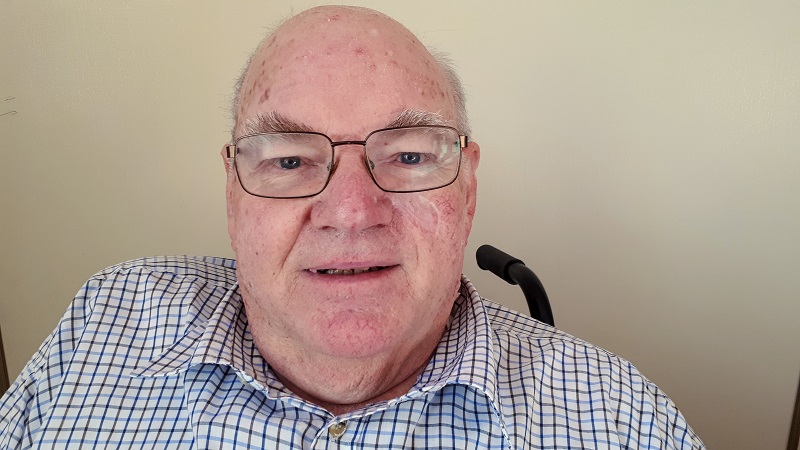
Gordon Richardson (BSc 1974) was three years old when he contracted polio while living in Hong Kong. He was initially completely paralysed, save for some movement in his right eye, but over time he regained some muscle use in his upper body. While a young undergraduate student at the University of Bristol, he was told it was unlikely he would live beyond the age of 50.
Now in his 60s, Gordon is Co-Chair and Treasurer of the Bristol Disability Equality Forum and National Chairman and Chair of the Bristol Branch of the British Polio Fellowship. He has worked tirelessly to advocate for people with disabilities and this April is being awarded an Honorary Degree from Bristol in recognition of his achievements. We talk to him about his remarkable career, fond memories of being a student and his advice for students graduating this year.
Can you tell us about the Bristol Disability Equality Forum?
The Disability Equality Forum is an organisation of and for disabled people, whatever their impairment. We work closely with Bristol City Council, the NHS and other organisations to ensure provisions are made for people with disabilities. So much city planning and equipment design is done by people who are not disabled, but you need the input of people with lived experience to make things that work for everyone.
Currently we are doing a lot of work on climate control measures in people’s homes. It can be expensive to replace old, inefficient heating systems and the disability allowance doesn’t go very far. We advocate for disabled people who might need to make adjustments to their homes but can’t afford to do so.
As a representative of the Equality Forum I also sit on Bristol Walking Alliance. In this role, I help with the planning and infrastructure of the walking environment for everyone in Bristol – this includes pathways, footways, bridges, dropped kerbs and raised counters for the buses. Since lockdown, many cafes and restaurants have expanded their businesses onto the pavement, but this can be very dangerous for people who are blind and are used to walking down the street without obstacles. Similarly, if a car parks on a pavement, it can be a hazard for people like me who use a wheelchair. Sometimes I will have to go onto the road to get around the car and stay on the road until there is a dropped pavement. I work to represent these access needs and promote safe roads for everyone.
You graduated with a degree in Economics and Accounting in 1974. What is your favourite memory of studying at Bristol?
I loved my three years at the University. I made fantastic friends at Bristol, many of whom are still my closest friends. I remember sitting around, drinking lots of coffee, listening to records and chatting about what was going on in the world. Sometimes we would go out for a treat at lunchtime and blow 30p on a pizza, rather than 20p on a meal at the Student Union! We still get together once a month, 50 years after we left.
How did studying at Bristol set you up for the future?
Studying at Bristol helped me to understand that life isn’t just about hard work. You have to enjoy yourself too. Strangely, when you do, it gives you more time to get the other things done, like passing exams. Participating in RAG week and hanging out with good friends also taught me to help those less fortunate than myself, and to give back what I can. When I retired I thought to myself, I have got so much out of society, not least in medical support over the years, it’s time to put something back in. That has been my skill and my focus, to help less fortunate disabled people.
What has been the proudest moment of your career to date?
Qualifying as an accountant and passing my exams in financial planning was an amazing moment for me. Another proud moment was when I was a Trustee at the Vassall Centre and we were awarded the Queen’s Award for Voluntary Service in 2004. We went to a reception at St James’s Palace and the Royal family, the Prime Minister and half the cabinet were there. We were just a little bit pleased, shall I say.
What life advice would you give to a student graduating this year?
Keep in touch with all your friends! It’s absolutely vital. And make use of your degree in the best way you can. You don’t have to do a job that is directly related to your degree. After I graduated, I started my accountancy training at a practice in Bristol with 11 other graduates, and only two of us had studied accountancy. You learn so many skills at university that aren’t just related to your subject – how to talk to people, how to have an open mind, how to discuss things, how to listen to other people’s points of view. These are so valuable to our development.
In April 2022, you’ll be awarded an Honorary Degree from the University of Bristol. What does this mean to you?
It is a tremendous honour to be awarded an Honorary Degree from your own university. It made me very pleased and my family were so proud. A lot of the work I have done would not have been possible without my colleagues so I hope they will enjoy it with me.
